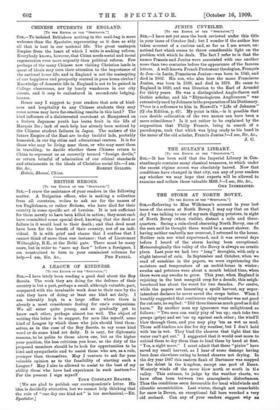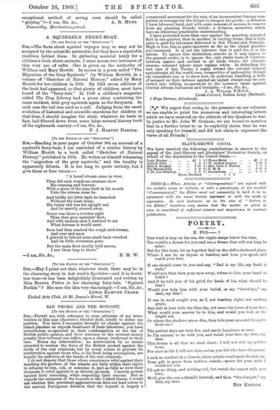TEE STORM AT NORTH BOVEY.
[To THE EDITOR OP THE "SPECTATOR.") Sra,—Referring to Miss Wilkinson's account in your last issue of the storm at North Bovey, I may say that on that day I was talking to one of my men digging potatoes, in sight of North Bovey (when visible), distant a mile and three- quarters. Seeing a rain-cloud obscuring North Bovey, one of the men said he thought there would be a smart shower. So having neither umbrella nor overcoat, I returned to the house. Neither rain nor wind supervened, and it was several days before I heard of the storm having been exceptional. Meteorologically this valley of the Bovey is always an erratic place. Last year we had two " long " droughts, with only a slight interval of rain. In September and October, when we read of sunshine in the papers, we were experiencing the moisture and temperature of an orchid-house in winter; swedes and potatoes were about a month behind time, when there were any swedes to grow. This year, when England is rejoicing in the best mangold crop for a decade, this neigh- bourhood has about the worst for two decades. Per contra, while the papers are lamenting a spoilt harvest, my super- intendent declares he never saved the crops better. When I humbly suggested that continuous rainy weather was not good ' for cut oats, he replied: " Did three times as much good as it did harm." By another man my ignorance was enlightened as follows : " Two men can easily pixy of 'em up ; each take two greeps (grips) and set 'em up against each other ; the wind'll blow through them, and you may pixy 'em as wet as mud. Those self-binders are fine for dry weather, but I don't hold with 'em in wet. They bind the sheaves that tight that the water can't get out." I suggested that it would cost more to unbind them to dry them than to bind them by hand at first. "Yes, a sight more." I must admit that these " pixies " have saved my small harvest, as I hear of some damage having been done elsewhere owing to bound sheaves not drying. In the dry year 1887 this eastern flank of Dartmoor was mapped as the driest in the kingdom, except one part of Essex. Westerly winds off the moor blow north or south in tle valley. This autumn, to judge by the weather charts, we have often been between two atmospheric disturbances. Thus the conditions seem favourable for local whirlwinds and climatic eccentricities. Last winter, though not remarkable for snow in Devon, an exceptional fall here wrecked a very old orchard. Can any of your readers suggest why as
exceptional method of saving corn should be called " pitying " P—I am, Sir, &c., A. R. HUNT. Foxworthy, Moretonhampatead.















































 Previous page
Previous page